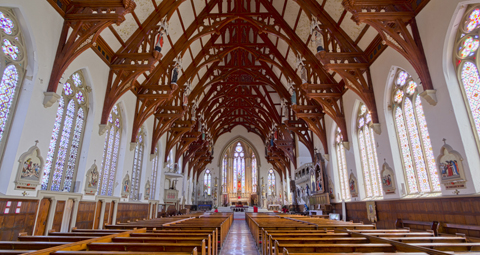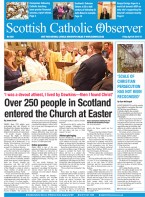June 16 | ![]() 0 COMMENTS
0 COMMENTS ![]() print
print

A pilgrim in Preston
In the first of a new series, Ross Ahlfeld heads to the North of England to an industrial town with a Catholic past.
“Cos we’re out of the black and into the red
So give us this day our daily bread
In a northern industrial town”
These lyrics from Northern Industrial Town by famous leftie folk-singer Billy Bragg have always struck a chord with me.
The mention of Our Lord’s Prayer next to ‘out of the black and into the red,’ makes me think of the Roman breviary with the liturgical text in black and rubrics in red.
These lyrics also acknowledge the deep bond which exists between the Christian Faith and the daily struggles of working-class communities which once existed in industrial towns and cities all across the United Kingdom.
For example, the city of Preston in the north-west of England was once a place where Christianity and class were intensely entwined. Preston has a
tenacious Catholic history and tradition which hung on after the Reformation—the name Preston literally means ‘priest town.’ Indeed, for a long time, Preston was regarded as the most historically Catholic place in England, where the Church held the allegiance of large numbers of Lancashire’s industrial working classes.
For us Scots, there is something familiar about the Catholic experience in Preston. You don’t get that sense we Scots Catholics sometimes get about the Catholic Church in England—that feeling of a Church dominated by an old Catholic gentry which thinks the answer to all their problems will come from one day usurping the Church of England and restoring Catholicism’s rightful place as the establishment Church once again.
This distinctly recusant, Brideshead Revisited vision of British Catholicism has never really understood the nonconformist and fiercely working class culture of Catholicism of Scotland.
In Preston, the Catholic community was maintained mostly by workers in the centuries-old cotton industry and so, in this sense, Preston’s Catholic culture has perhaps more in common with the heritage of my own Paisley Diocese than anywhere else.
Sadly, the diocese of Lancaster, like most dioceses these days, has shrunk drastically over the past few decades with the numbers attending Mass dwindling each year, even in the Catholic heartlands of Preston. So much so, that the presence of the Catholic Church in inner-Preston was almost finished back in 2007 when the famous St Walburge’s Church in the Maudlands area was threatened with closure.
Fortunately, in 2014 the Bishop of Lancaster handed St Walburge’s Church over to the care of the Institute of Christ the King Sovereign Priest (ICKSP), a Catholic missionary society founded in 1990. In my opinion, this was a brilliant move which ensured the future of the church and breathed new life into the local Catholic community. It’s also worth noting that an important aspect of the ICKSP charism is their use of the traditional Latin liturgy and a special devotion to the Eucharist.
As such, St Walburge’s has now been established as a shrine church which exists as a centre for Eucharistic Adoration while also serving as a place for Catholics who wish to discover the Extraordinary Form of Mass.
With all this in mind, I recently made a pilgrimage to Preston at the invitation of the wonderful Canon Gwenaël Cristofoli of St Walburge’s, who made me very welcome and gave me a fascinating explanation about the good work of the institute.
I would encourage everyone to try and join the canons of the ICKSP for Mass inside this resplendent Grade A listed building—which boasts the third tallest spire in England.
The transpennine express from Glasgow Central to Preston isn’t quite walking the Camino de Santiago, but to kneel before the Body, Blood and Divinity of Our lord, made present in Eucharist by the canons with such vibrancy, and to hear the older form of Mass being offered up in Latin, echoing around the Church, is to be a pilgrim in the truest sense. This is very much a daytripper’s pilgrimage for ordinary working people with jobs and families who need to be home for teatime.
Equally, to sit and listen to the evening vespers being chanted as beams of lights from the evening sun begin to stream through the stained glass, illuminating this grand old Gothic Church, is to glimpse something of Heaven.
Like me, you might be suddenly struck by the terrible thought of this important place of worship almost being allowed to close and you may even give thanks to God that it has not been.
Similarly, you may even be struck by just how special the work of the canons of the ICKSP is—they are moving into areas like Maudlands and bringing traditional liturgy to people who have never had the opportunity to hear or participate in the traditional Mass.
The kindness and hospitality shown to me by Canon Christofoli at St Walburge’s was matched by Simon Nash, who is better known as the Deepdale Duck club mascot at Deepdale Stadium, home to the famous Preston North End FC.
Mr Nash was kind enough to show me around the stadium and tell me the history of the club, which has always had a strong Scottish connection.
The great Bill Shankly spent the bulk of his playing career at Preston and since then Preston has had a succession of Scottish managers from Tommy Docherty, Alan Irvine and David Moyes to Billy Davis, Craig Brown and Graham Alexander.
You may well ask: what does the local football team and a chap dressed as a duck have to do with the Faith of our fathers? Part of the answer to this question can be found in Preston’s club badge, which features the Lamb of God with the letters ‘PP’ written underneath the lamb, signifying the Prince of Peace.
Indeed, in the north of England, football and Christianity have always been intertwined; from Manchester City and Everton being formed as church teams to Wolverhampton Wanderers striker and Jehovah Witness, Peter Knowles, the subject of yet another Billy Bragg song, God’s Footballer.
You might also be surprised to learn that Deepdale stadium is one of the few places where you can get a ‘butter pie’ at half-time. Simon tells me that Lancashire Catholics did not eat meat on fast days so they would use butter in their pies instead. Of course, I tried one and there’s no way these pies can be considered an act of penance, they are too delicious.
Like many things in Preston, the butter pie has its roots in the Catholic Faith; they were once enjoyed by the workers and are now part of the heritage and identity of Lancashire.
The same can be said for the very old Lancs tradition of Lenten beer, once a source of nourishment during long periods of fasting. Today, Preston has just the one brewery inside the city, namely the Hart Brewery which makes especially nice ale called the Pride of Lancashire.
The Catholic legacy of Preston is not entirely a matter of social history; there is a far more modern and less obvious manifestation of Catholic social teaching taking place in this city.
This particular expression of Catholicism can be found in Preston’s efforts to reverse the social problems which come with economic decline.
Much like our own post-industrial towns and cities here in Scotland, Preston is a city which has suffered from high unemployment but has responded with a co-operative involving various different enterprises which are all jointly owned and operated by members for their mutual benefit
These workers co-ops supply local institutions—hospitals, councils and universities—aiming to keep what they earn in the local area. This helps create wealth in the community which in turn supports the co-ops. This type of economic model harks back to Fr José María Arizmendiarrieta, the founder of the Mondragon co-operative movement in Spain. Mondragon is a collection of workers’ co-ops established in the Basque town of Mondragoe in the 1950s based on the Catholic social teaching of Fr Arizmendiarrieta.
What can we in Scotland learn from what is happening in Preston?
Well, there is certainly something to be said for the restoration of a simple Faith devoid of intellectualism, fed on beautiful liturgy and popular devotions. Especially since it was these aspects of liturgy and devotion which seemed to most appeal to the working classes and especially men who no longer attend Mass.
There are some who have argued that the older form of Mass retains a quality of what could be described as a ‘working class spirituality of perseverance in adversity.’ The very same ‘perseverance in adversity’ perhaps alluded to by Billy Bragg’s lyrics quoted above. There is also something to be said for societies such as the Institute of Christ the King Sovereign Priest taking on abandoned churches. We need only look at the work of the Franciscan Friars of the Renewal in Bradford to see how successful such initiatives can be.
I appreciate that not everyone is keen on the notion of distinctly traditionalist Catholic communities with special charisms establishing themselves in dioceses alongside the existing parish networks.
But societies such as the ICKSP are not rivals to the parish, rather they enrich and enhance the diocese by bringing a new dynamic and energy to parishioners.
In reality, this direction of travel seems to be the future for dioceses and the wider Church in general. For me, this is the restoration and renewal called for in Rod Dreher’s Benedict Option now happening. Already, young people in Preston are being drawn to the Traditional Latin Mass.
Families are starting to move into the area around St Walburge’s just as a community of Catholics is forming around Our Lady of the Annunciation of Clear Creek Abbey in the Ozark foothills of north eastern Oklahoma. The ICKSP are even planning on creating an independent Catholic school at St Walburge’s.
When I was a child, my Gran and Papa used to take my brother Robert and I down to Blackpool for the weekend. We both recall these summer holidays to Blackpool with great fondness.
In later years I was more interested in making the pilgrimage to Salford Lads Club and the Salford Working Class Movement Library.
Maybe Scottish Catholics could start making new pilgrimages to the north-west of England, not to the Pleasure beach for donkey rides or for Blackpool rock or even ‘kiss me quick’ hats but for Jesus.
The great spire of St Walburge’s points the way to Christ who waits for us in the Eucharist among the historic cotton mills, pubs, terraced houses, breweries, pies and football stadiums.
I’d like to dedicate and offer up this pilgrimage for the success and good work of Paisley Diocese’s vocations director, 90’s Manchester bands aficionado and long suffering Greenock Morton supporter Fr John Morrison. If there’s anyone who understands this strange mix of culture, music, football and our Faith, then it’s my old mate Fr John.
God bless our priests. Let’s never forget to thank and pray for them. As long as we have priests we’ll always be able to say, ‘It’s turned out nice again.’
Next month: Ross Ahlfeld visits the Clyde coastal town of Largs










